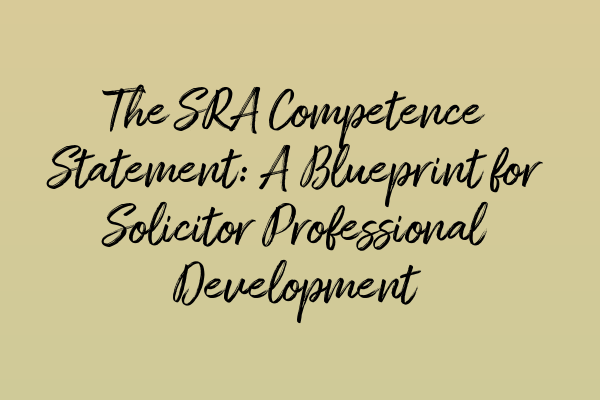The SRA Competence Statement: A Blueprint for Solicitor Professional Development
As a solicitor, it is crucial to constantly strive for professional growth and development. The legal landscape is constantly evolving, and it is essential to stay up-to-date with the latest industry standards and regulations. To ensure that solicitors are equipped with the necessary skills and knowledge, the Solicitors Regulation Authority (SRA) has introduced the Competence Statement – a comprehensive blueprint for solicitor professional development.
What is the SRA Competence Statement?
The SRA Competence Statement is a framework that outlines the essential skills and qualities that solicitors need to possess in order to carry out their legal duties effectively. It serves as a benchmark for solicitor competency and sets out the standards that solicitors are expected to meet throughout their careers.
The Competence Statement is structured around four key areas:
1. Ethics, professionalism, and judgment: Solicitors are required to adhere to the highest ethical standards, demonstrate professionalism in their interactions, and exercise sound judgment in their decision-making processes. This includes maintaining client confidentiality, acting with integrity, and upholding the rule of law.
2. Technical legal practice: Solicitors must possess a solid foundation of technical legal knowledge and understanding. They need to be able to apply this knowledge effectively to provide accurate and relevant legal advice to their clients. This includes staying up-to-date with changes in legislation and case law.
3. Working with other people: Solicitors must be skilled in working collaboratively with clients, colleagues, and other professionals. This involves effective communication, negotiation, and teamwork abilities. Building strong professional relationships is crucial for successful legal practice.
4. Managing themselves and their own work: Solicitors need to be proficient in managing their own workload and time effectively. This includes prioritizing tasks, meeting deadlines, and demonstrating organizational skills. Solicitors should also be proactive in updating their professional knowledge and skills through continuous professional development (CPD).
Importance of the SRA Competence Statement
The Competence Statement is important for solicitors for several reasons. Firstly, it ensures that solicitors are delivering a high standard of legal service to their clients. By setting out clear standards of competence, the SRA ensures that solicitors are equipped to handle cases effectively and provide accurate legal advice.
Additionally, the Competence Statement helps solicitors enhance their professional development. By identifying areas of strength and areas for improvement, solicitors can focus their efforts on acquiring the necessary skills and knowledge to advance in their careers. It serves as a guide for solicitors to identify the training and development opportunities that will support their growth.
Furthermore, the Competence Statement is fundamental for solicitors to maintain their SRA practising certificate. The SRA requires solicitors to demonstrate their ongoing competence throughout their careers. This can be achieved through a combination of CPD activities, such as attending training courses, participating in webinars, or conducting legal research.
Tips for Meeting the Competence Standards
Meeting the Competence Standards set out in the SRA Competence Statement requires a proactive approach to continuing professional development. Here are some tips to help you stay on top of your professional game:
1. Stay updated with changes in legislation and case law: Regularly review legal publications, attend seminars, and participate in webinars to ensure that you are well-informed about the latest legal developments in your practice area.
2. Seek feedback and reflect on your performance: Regularly seek feedback from clients, colleagues, and supervisors to gain insights into areas of improvement. Reflect on your performance and identify ways to enhance your skills and knowledge.
3. Undertake relevant training and development activities: Participate in CPD activities that are relevant to your practice area and align with the areas identified in the Competence Statement. This can include attending seminars, workshops, or online courses.
4. Engage in networking and collaboration: Join legal professional associations or networks to interact with peers and gain exposure to different perspectives and experiences. Collaborate with other professionals on projects or cases to enhance your teamwork and communication skills.
5. Utilize mock tests and practice resources: Practice your legal skills and test your knowledge using mock tests and practice resources. This can help identify areas where you may need to focus your learning and development efforts.
In conclusion, the SRA Competence Statement provides solicitors with a clear blueprint for professional development. By adhering to the Competence Statement, solicitors can ensure they possess the necessary skills and knowledge to meet the evolving demands of the legal profession. Continuous professional development, in line with the Competence Statement, is crucial in maintaining high standards of legal practice and delivering excellent services to clients. Embrace the opportunities for growth and development outlined in the Competence Statement and pave the way for a successful and fulfilling career as a solicitor.
Related Articles:
– Mock Tests for SQE Criminal Practice: Test Your Knowledge and Skills
– SQE Prep Made Easy: Strategies and Resources
– SQE Prep: Tips and Tricks to Excel in Criminal Law
– Terrorism and Criminal Law: Balancing National Security with Justice
– Summary vs. Indictable Offences: Understanding the Differences


Leave a Reply